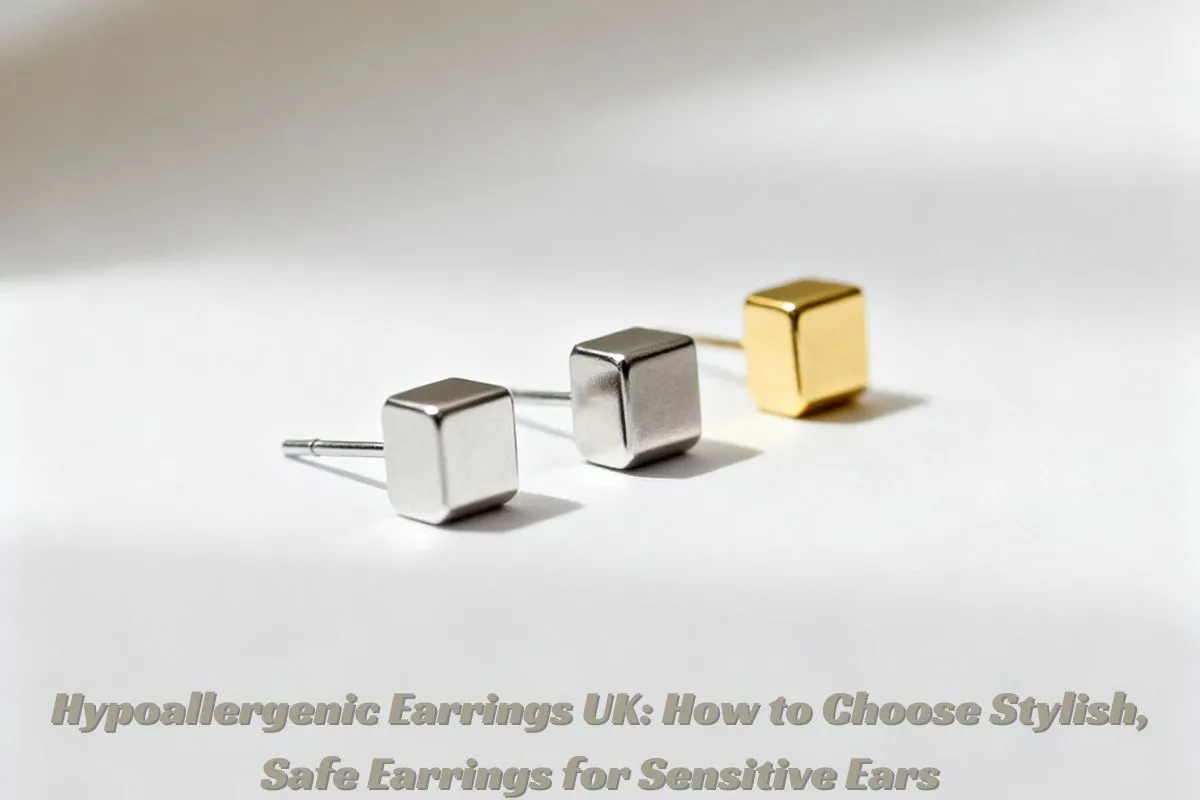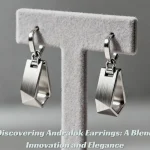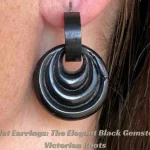If you’ve ever dealt with itchy, red, or sore ears after wearing jewellery, you’re not alone. Sensitive ears affect millions of people in the UK, making hypoallergenic earrings an essential trend for both comfort and style. The good news? Today’s UK jewellery market offers safer, chic options than ever before. Whether you’re buying for yourself or gifting a loved one, this guide is designed to help you confidently find beautiful earrings that deliver both fashion and comfort.
Why “Hypoallergenic Earrings UK” Matters
Not all earrings are created equa,l especially for sensitive skin. For years, even a quick trip to the high street meant sifting through dozens of “nickel-free” or “hypoallergenic” claims, never quite sure what materials lay beneath the sparkle.
I used to buy earrings from market stalls, thinking “hypoallergenic” meant pain-free. But by the end of the week, my lobes were red and itchy. It wasn’t until I started researching UK hallmarking and reading real materials lists that I finally stopped suffering.
Today’s UK buyers want beauty with peace of mind. This article focuses on how to shop smart: understanding what “hypoallergenic” means, which metals are best, what features and brands to trust, and how to avoid common mistakes.
What Does “Hypoallergenic” Mean? (And Why Terms Vary)
In theory, “hypoallergenic” describes earrings made to reduce the risk of allergic reactions mainly by avoiding nickel, the most common culprit. But here’s the catch: in the UK, the term isn’t strictly regulated. Retailers can use it freely, and sometimes products labelled “hypoallergenic” still contain trace metals that cause irritation.
Nickel: The Hidden Enemy
For most people with sensitive ears, nickel triggers the reaction. Even tiny amounts in an alloy or plating can cause itching, swelling, or rashes. This is why informed UK shoppers check for “nickel-free” or “REACH-compliant” marks. Look for specifics on EU safety limits for nickel release and UK jewellery standards to minimise risk.
UK Retailer Definitions
Some UK retailers, like Solace Jewellery and Lisa Angel, detail their metal makeup and manufacturing standards, helping customers avoid surprises. Accessorize, M&S, or even online marketplaces can be hit-or-miss, so always check descriptions before you buy.
Best Metals for Sensitive Ears + UK Hallmarks to Check
Knowing which metals suit sensitive ears can save pain and expense. Here are the top choices in the UK, along with hallmarking clues to look for:
Sterling Silver (Marked “925”)
925 sterling silver contains 92.5% pure silver and (usually) copper as the rest. Both metals are low-risk for most people. Always look for the “925” stamp a UK hallmark of purity. Avoid “silver-plated” unless you see full metal details, as plating can wear off and expose base metal.
Titanium
Titanium is lightweight, strong, and nearly always nickel-free. UK brands like Solace or Tini Lux (and various Etsy makers) offer titanium earrings for even the most sensitive ears. Pure titanium is hypoallergenic, but be wary of “titanium-plated” base metals.
Surgical-Grade Stainless Steel
Surgical steel can be safe especially 316L or 316LVM grades. It’s budget-friendly, durable, and often used in medical settings. Just check for verification; some cheaper “stainless” pieces may contain nickel.
Gold (9ct, 14ct, or Higher)
For UK buyers, gold is a classic. Choose 9ct or 14ct and above, ideally hallmarked by a British assay office. The purer the gold, the safer especially if the alloy is nickel-free. Avoid mystery “gold-plated” earrings unless the under-layer is disclosed.
Niobium & Platinum
Rare, but effective for ultra-sensitive ears. Niobium and platinum jewellery is premium-priced in the UK, but these metals are entirely biocompatible meaning almost nobody reacts to them.
UK Hallmarks to Trust
For sterling silver: look for “925” or the official UK hallmark. For gold: British hallmarks or carat stamps (“375” for 9ct, “585” for 14ct, “750” for 18ct). For titanium/surgical steel: trust reputable brands, read all product details, and prioritise “nickel-free” labels.
How to Shop Smart in the UK: What to Look For & What to Avoid
Read Material Descriptions, Not Just Labels
Skip vague “hypoallergenic” or “silver/gold tone” earrings, look for real material breakdowns. Well-established UK sellers detail their alloys, plating, and backings, ensuring you know what goes against your skin.
Check for Nickel & Alloy Risks
-
“Nickel-free” is essential, but make sure it’s not just in the outer plating; core metals matter too.
-
Ask if plating wears off, are you left with a nickel, brass, or zinc base?
-
UK brands with transparent policies (e.g., Solace Jewellery, Lisa Angel, Astrid & Miyu, Baltic Beauty) offer trustworthy lines.
UK-Specific Considerations
-
Hallmarking is regulate,d look for official “925,” carat, or titanium marks by British assay offices.
-
Consider VAT and shipping. UK-based sellers simplify returns; check costs before you buy.
-
For online-only brands or global marketplaces (Etsy, Amazon), verify where the earrings are made and what customer support channels exist.
Style Isn’t Sacrificed!
Sensitive ears don’t mean boring jewellery. Today’s hypoallergenic earrings come in every style: hoops, huggies, studs, drops, and statement designs. Look for brands that combine safety and trend, like Smoothie London, Tini Lux, and Solace Jewellery.
I used to think my choices were limited to boring surgical studs. Shopping UK brands online this year, I found rose gold titanium huggies, sparkling CZ drops, and sculpted heart studs all totally comfy and on-trend.
Care & Lifestyle Tips for Keeping Your Ears Happy
Symptoms to Watch For
UK weather (rain, humidity, cold) can worsen metal reactions. If you notice:
-
Itching
-
Redness or swelling
-
Burning sensation
-
Flaking or weeping skin
You likely need true hypoallergenic earrings and gentle care.
How to Care for Hypoallergenic Earrings
-
Clean regularly using warm soapy water and a soft brush.
-
Avoid wearing earrings while swimming in pools, salty seas, or exercising heavily sweat and chemicals can speed up plating breakdown.
-
Check backings and joins for corrosion; keep earrings dry when possible.
-
Rotate earrings and take breaks from wearing jewellery overnight.
My sister switched to titanium studs after years of irritation. She now cleans them every week and skips earrings on gym days. Since then, she’s had zero flare-ups.
Top UK-Friendly Style Picks & Trending Designs
Affordable Choices
-
Solace Jewellery: Titanium and surgical steel studs, hoops, and drops, sleek and minimal for everyday wear.
-
Lisa Angel: 925 sterling silver huggies and 14ct gold studs, budget lines and trend-led collections.
-
Baltic Beauty: Amber and sterling silver options, great for people who love natural stones and classic designs.
Premium Choices
-
Tini Lux: Medical-grade titanium in hoops, studs, and bold designs; especially good for curated ear stacking.
-
Astrid & Miyu: Offers gold-plated sterling and titanium, minimalist and contemporary.
-
Etsy UK: Hundreds of independent makers selling nickel-free, gold, and titanium options at every price point.
Trending Styles
-
Rose gold huggies in titanium or 925 silver
-
Gemstone studs (emerald, sapphire, CZ)
-
Minimalist geometric drops with hypoallergenic metals
-
Birthstone and custom-engraved earrings
Before you buy, check return policies, warranties, and reviews, especially for new or indie UK brands.
FAQs for UK Buyers
What are the best hypoallergenic earrings?
Titanium, platinum, 925 sterling silver, and 14ct+ gold earrings are typically safest. UK makers like Solace, Tini Lux, and Lisa Angel offer great choices.
Is M&S jewellery hypoallergenic?
M&S often offers nickel-free options, but always read materials lists. Avoid “base metal” or plated pieces if you’re sensitive.
Is 100% sterling silver hypoallergenic?
Pure silver is hypoallergenic, but “sterling” means 92.5% silver with copper alloy. Most people tolerate sterling, but highly sensitive skin should always check for trace metals and go for verified UK-hallmarked items.
What metal is truly hypoallergenic?
Titanium and platinum are the most biocompatible, suiting nearly every wearer. Niobium is also a top choice, but less common.
Conclusion: Choose Safe, Stylish, Comfortable Earrings
Sensitive ears no longer mean hiding your style. The UK market now offers beautiful, fashion-forward hypoallergenic earrings at every budget if you know where and how to shop. Look for hallmarking, nickel-free claims, and detailed material listings. Pick metals like 925 silver, gold, titanium, or platinum. Don’t settle for “hypoallergenic,” be specific!
Whether your sensitive ears are a lifelong challenge or a recent surprise, this guide should help you enjoy earrings that look great and feel even better. Want more styling tips, brand picks, or care advice for UK jewellery? Just ask!




